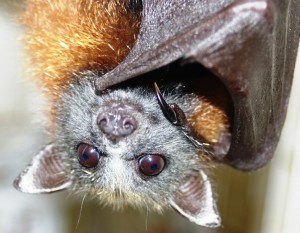Flying-foxes (also called fruit bats) are members of a large group of mammals called bats. They are the only group of mammals in the world capable of sustained flight. There are 4 recognised species of flying-foxes on mainland Australia: the little red, grey-headed, black and spectacled. They have a very keen sense of smell and good eyesight, both of which are needed to locate their food during the night. Flying-foxes are a protected native Australian species. They are usually found in coastal areas of Melaleuca and Casuarina swamps, mangroves, heaths, dry and wet eucalypt forests, woodlands and rainforests. The little red flying-fox can also be found further inland in arid and semi-arid areas.
 Flying-foxes play an essential role in our environment. The food that they eat, and the method by which they forage and process food, has lead to flying-foxes being one of the most efficient pollinators and seed dispersers of native Australian forest trees. As they move amongst the flowers of eucalypts and melaleuca searching for food, large amounts of pollen stick to their fur. Then when they fly to the next tree, which may be several kilometres away, this pollen is spread to other flowers, thus pollinating them. Such pollen transport is essential for many native trees, as they rely on cross-pollination coming from other trees from substantial distances away.
Flying-foxes play an essential role in our environment. The food that they eat, and the method by which they forage and process food, has lead to flying-foxes being one of the most efficient pollinators and seed dispersers of native Australian forest trees. As they move amongst the flowers of eucalypts and melaleuca searching for food, large amounts of pollen stick to their fur. Then when they fly to the next tree, which may be several kilometres away, this pollen is spread to other flowers, thus pollinating them. Such pollen transport is essential for many native trees, as they rely on cross-pollination coming from other trees from substantial distances away.
In the case of seed dispersal, many seeds will simply not grow unless they are a certain distance away from the parent tree (which is fascinating in itself), so flying-foxes disperse seeds in 3 unique ways: 1) carrying fruit by air and dropping it, 2) carrying fruit away, eating it and spitting out the seeds, and 3) eating the fruit and seeds, which passes through their system, aiding germination. Flying-foxes have a very short digestive tract, so seeds swallowed are not digested, but simply pass through their gut within 10-30 minutes.
If you find an injured or sick flying-fox or any bat, please contact the Bat Rescue Hotline urgently on 0488 228 134 and for more info please visit www.bats.org.au
